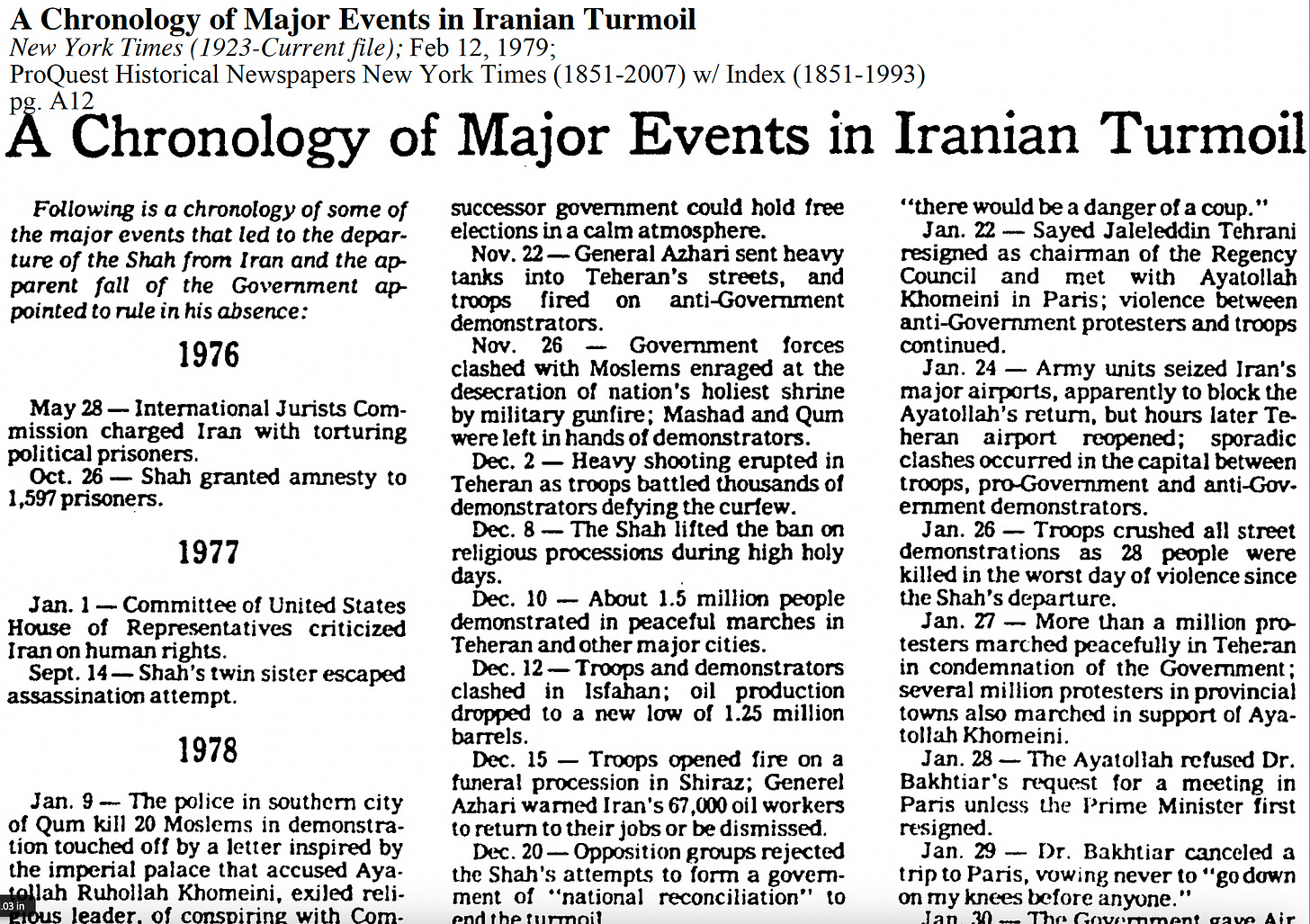War in Iran Diary-Entry 1
In a fast changing situation, here are my thoughts for today.
One week ago, what the New York Times has called the “Israel-Iran conflict” began. For what it’s worth, it bears remembering that on February 12, 1979, the Times called the Iranian revolution a “turmoil.1
On Friday the 13th of June, I woke up to see my phone had blown up with notifications from various friend and family groups situated across the world with a similar message: the unthinkable had happened. Text exchanges in a friend group based in Iran began around 3:30 am Tehran time with “oh no war started” and “what was that sound?” “guys, I woke up as if it was the missile attack on Tehran [from 1988]” and “we’re going to get slaughtered.” As people made their way through the fog of interrupted sleep, it began dawning on them that bombs were really falling. The next night, texts from Iran contained not only reports of bombs but the loud and unending noise of drones, so close that some thought it was going to crash into their homes. But even then, the reality of war had not set in. Friends and family went to work even though unlike the war with Iraq, the sound of explosions weren’t just a night time thing. Talk quickly turned to leaving the city. People exchanged the news that first Israel and then Trump had warned to evacuate Tehran, a warning that was issued, in Trump’s case, in the middle of the night. (Katz repeated the call for “mass evacuation” of Tehran today, June 20, to “destabilize the regime.2)
Those of us outside of Iran have been glued to our phones, every minute asking a loved one inside “Hi, you ok?” Then on Wednesday, text notifications from Iran went quiet. My phone is now full of single-checked whatsapp and telegram messages of “Hi, you ok?” or “Salam!” left unanswered and unseen. Even looking at these empty texts fills me with dread.
Those of us outside of Iran try to manage our ever rising anxiety. We sheepishly remind each other that however debilitating it feels to not know what is going on and to not be able to stop this war, we’re still better off than our loved ones in Iran. To alleviate this 10 ton rock of anxiety crushing our chests, we make fun of ourselves with memes depicting our friends in Iran walking coolly and suavely on the runway while we, the diaspora population, are losing it, crying like babies.
Most of us feel it’s impossible to carry on, most of us feel we can’t and don’t want to explain it to people who, never having tasted war—building toppling, flesh burning war—share no vocabulary with us. A friend observed that the first people to reach out and check in with them were Palestinian and Israeli friends. An unofficial survey of 3 other people, including myself, backs up this observation: Pain sees pain.
Some days ago, in a now viral clip, Tucker Carlson asked Ted Cruz the population of Iran (I’m not linking to it but it’s easy to find). Cruz who is advocating (and has been for a while), a US attack on Iran couldn’t answer it. 92 million Tucker responded smugly and correctly.
Here’s some more info: Iran’s population in 1980 when the eight year war with Iraq started was a bit shy of 40 million. In other words more than half of its population is born after the 1979 revolution that toppled the Pahlavi monarchy and eventually established the Islamic Republic of Iran.
Iran’s urban population constitutes roughly 73% of its population. In 1979, the urban population was a little less than 50%. Interestingly, at the time of the revolution, Iran had only one city with a population of over one million: Tehran, at roughly 4.5 million. Today, Tehran proper has a population of about 10 million that increases to a bit less than 17 million if you take into account places like Karaj and Qarchak which have for all intents and purposes been swallowed up by the ever expanding metropole. It’s the second largest city in the Middle East after Cairo. Its population density is 11,800 people per km squared, on par with New York.
It should be obvious that you can’t evacuate 10 million people particularly since the areas around it are also densely populated and also under attack. But discussing the impossiblities of evacuation provides an opening to understand what it has meant on the ground to pack up and leave.
Since Friday the 13th of June, people who can afford to and who have family or friends they can stay with have leaving the capital. This is the key: To evacuate, you have to be able to afford it, both financially and physically. In the first days of the bombings, some of the roads were jam packed with cars, turning 2 hour trips to 8 hours. Long long lines at the gas station were reported. People were crowd sourcing gas stations with short lines and less busy routes. But since then, the traffic flow has eased up. A city defined by the crush of humans living together against the backdrop of a snow-peaked mountain has emptier streets. People remaining have posted photos of the iconic orange clad street sweepers still going about their work. One man took to video to remind others in Tehran to feed the alley cats now that there was less trash and discarded food for them to eat.
There are no governmental camps or dedicated safe spaces for the population fleeing the capital. So what that means in a concrete way is that you need to either afford to rent a place, or have a second home, or have relatives/friends in a town or city that is relatively safe. You need to have money to shut things down and go away, to buy bottled water and food supplies. Most importantly, to evacuate you need to want to evacuate or physically be able to. Many elderly people either don’t want to leave their homes or can’t leave them. Many of them are taken care of by their children who then also can’t leave and their children have children, who also have to remain. Since Israel began its attacks, services such as psychiatric hospitals and rehab centers have told families to come get their patients and keep them at home. Prisons, many of which are filled with political prisoners, obviously can’t evacuate.
Tehranis of a certain age and older have done this before. Most intensely in the early months of 1988 in what eventually turned out to be the last year of an 8 year long bloody war between Iran and Iraq. In February 1988, Iraq finally managed to obtain long range scud missiles and rained them on multiple Iranian cities, particularly Tehran. Iran responded in kind, bombing Iraqi cities.
This wasn’t the first time the two targeted urban areas throughout the war but the long range missiles were game changers, much like today the drone attacks are. Before that, to bomb a city like Tehran, Iraqi planes had to make their way from their bases into Iranian airspace and were often confronted by anti-aircraft missiles. As the Iraqi planes reached Tehran a voice that haunts me until today would intone from radio and television saying “Attention! Attention! The sound you are currently hearing is a signal for danger or a red situation and means that an aerial attack will be occurring. Leave your place of work and go to a shelter” and then a siren would go off and the city’s electricity would be shut down.
Sometimes you had enough time to run to your home or your building’s basement with some time to spare before the sound of anti-aircraft missiles filled the night skies (always night) sometimes you were barely out the door when it happened. Hiding in shelters was/is a communal act. In our building, the shelter was one floor below ground level underneath the staircase that threaded all five floors of the building. There, all the neighbors would gather, speaking in hushed tones with one or two people carrying their transistor radios to monitor, not the situation, but the white siren that would give us the all clear. The situation itself, we monitored through our bodies: Our ears became tuned to the difference between the sound of anti-aircraft missiles and bombs, to the difference between glass shattering and cement crumbling (it helped that the former announced itself before the latter), to the difference between the silence that filled the space between two bombs and the silence that came when it was all over. Once the white siren glided out of the radios, we would all walk up the stairs to our apartments, the electricity back on, the walls and windows intact. And then: go do your homework! My mom would order as she walked into kitchen to finish making dinner. And then the familiar sound of tuning a short wave radio as my father checked to see where had been hit.
All of that changed in February 1988 because long range scud missiles don’t announce themselves. They just kill you. Randomly. No pretense to precision. Just boom! You’re dead. Or worse: Someone you love is dead.
And so the people of Tehran began to evacuate, going out of town, to Shomal, to their hometowns, to places where there was no threat of a random death from the sky. Rumors began circulating about people pitching tents in the desert because they had nowhere else to go and dying from scorpion bites, adding the land to the air as horrifying causes of death. According to the New York Times, half of the city’s 6 million people had left by April 1988.
We didn’t leave even though schools were closed. My parents, civil servants, still went to work. So we didn’t leave. There was a short trip we made to Shomal and stayed with the family of a friend of mine. We were multiple families taking shelter with them and the kids…well we had a glorious time, staying up late, going by the seashore, even engaging in a little innocent flirting with the son of the other family taking refuge.
But for the most part, we didn’t leave.
We stayed, sleeping in the kitchen sometimes, where there were fewer windows, mitigating the chances of dying from shards of glass. And sometimes we slept in the hallway, all of us cramped into the space together, listening as
one
two
three
four
five
six
seven
eight missiles fell all night long, randomly paced and randomly targeted.
My friends, some of whom have evacuated and some not all felt those missiles fall that night and all those other nights. We were 16 then. They’re 53 now. What that does to you is, to quote another friend, surreal. What that does to you…we’re still trying to figure it out.
These are the true things for now. I promise more will come later.
https://novaramedia.com/2025/06/20/israeli-defence-minister-calls-for-mass-evacuation-of-tehran/




